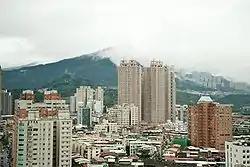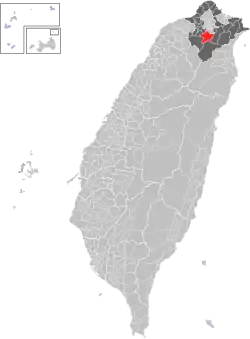Xindian District
Xindian District (Chinese: 新店區; pinyin: Xīndiàn Qū) is an inner city district in the southern part of New Taipei City, Taiwan.
Xindian
新店區 Shinten, Sindian, Sintien, Hsintien, Hsin-tien | |
|---|---|
| Xindian District | |
 Xindian skyline | |
 Location of Xindian within New Taipei City | |
| Coordinates: 24°57′N 121°32′E | |
| Country | Republic of China (Taiwan) |
| Region | Northern Taiwan |
| Special municipality | New Taipei City |
| Area | |
| • Total | 120.2255 km2 (46.4193 sq mi) |
| Population (January 2016) | |
| • Total | 300,283 |
| • Density | 2,500/km2 (6,500/sq mi) |
| Time zone | UTC+8 (CST) |
| Postal code | 231 |
| Website | http://www.xindian.ntpc.gov.tw/ |
| Xindian District | |||||||||||||||||||
|---|---|---|---|---|---|---|---|---|---|---|---|---|---|---|---|---|---|---|---|
| Chinese | 新店區 | ||||||||||||||||||
| |||||||||||||||||||
Name
Xindian's name originated during the Qing Dynasty close to 300 years ago. According to legend, a person named Lin and others came from Quanzhou, Fujian Province. On a mountain road leading to Wulai, they built a small cabin and opened a store selling groceries and for the exchange of goods with mountain aborigines. Since the store had no formal name, travelers called it Sintiam (Chinese: 新店; pinyin: Xīndiàn; Pe̍h-ōe-jī: Sin-tiàm; lit. 'new store').
An area usually not considered as part of Xindian is Ankeng (安坑), although it is within the jurisdiction of the city, located in a valley on the west side of the Xindian Creek. It was originally called Amkhe'ar (暗坑仔; Ànkēngzǎi; Àm-kheⁿ-á; 'dark/secret gorge'), due to luxurious vegetation in the area. However, it was later decided to be indecent and the name was changed to Ankeng (安坑; Ānkēng; An-kheⁿ; 'peaceful gorge').
History
Empire of Japan
In 1920, during the period of Japanese rule, the area was established as Shinten Town (Japanese: 新店街), Bunsan District, Taihoku Prefecture.
Republic of China
The Kuomintang government moved the seat of government (in exile) of Fujian Province to Xindian from 1956 to 1996. Although in 1980, it was still underdeveloped, the four-lane Zhongxing Road helped to develop the city. Areas south of Xiaobitan are still farmland. After the second National Highway opened, parks along Xiaobitan and Xindian Creek gave way to development. With the opening of the Taipei Metro, more commercial development and businesses have come into the area. In 2004 when the Tzu Chi Hospital branch opened, a new road was constructed to deal with traffic.
Originally established as urban township of Taipei County, Xindian was upgraded to a county-administered city on 15 January 1980. After Taipei County was upgraded to New Taipei City on 25 December 2010, Xindian City became a district.
Geography


Xindian is located on the south side of the Taipei Basin, mainly on the plains between the Xindian Creek, its tributaries, and the mountains (the Xueshan Range). The Nanshi River merges with the Beishi River in Xindian, forming the Xindian Creek, one of the major tributaries of the Tamsui River. The Xindian Creek generally flows from south to north, dividing the city into east and west sides of the creek. Although the western side (Ankeng) covers a larger area, residential, administrative, commercial, and transportation centers are all on the eastern side of the creek at Dapinglin (大坪林). Population distribution in the Ankeng region is mainly concentrated in the southeastern hillside residential communities.
The district is located in southern New Taipei City. To the north is the Wenshan District of Taipei City and the Jingmei River, to the east it borders the district of Shiding, to the south it borders the district of Wulai, and to the west it borders the district of Sanxia.[1] Compared to other districts in New Taipei City, Xindian is more influenced by Taipei City; many public projects including the Taipei Metro, The Xiaobitan Branch Line and Xindian Line in this district. five stations of which are located in the city: Xiaobitan, Dapinglin, Qizhang, Xindian District Office and Xindian and the Feitsui Dam are in the district.
Xindian has many traditional markets that have decades of history. The Taipei County Police Department has ten divisions in Xindian.
Administrative divisions
Xindian is divided into 69 villages (里), then further divided in 1,447 neighborhoods (鄰).
Government agencies
Education
Universities
Vocational schools
- Cardinal Tien College of Healthcare and Management
- Kaiming Senior Vocational School
- Nanqiang Senior Vocational School
- Zhuangjing Senior Vocational School
- Nengren Home Economics Vocational School
High schools
- New Taipei Municipal An Kang High School
- New Taipei Municipal Hsin Tien Senior High School
- Chi Jen Private High School (Private)
- Our Lady Of Providence Girls' High School (Private)
- Kang Chiao International School (Private)
Junior high schools
- Da Guan Junior High School
- An Kang High School
- Chi Jen Private High School (Private)
- Our Lady Of Providence Girls' High School (Private)
- Kang Chiao International School (Private)
- Wenshan Junior High School
- Wu Feng Junior High School
Elementary school
- Sindian Elementary School
- Jhihtan Elementary School
- Gueishan Elementary School
- Chung Cheng Elementary School
- Qing-Tan Elementary School
- Da-Feng Elementary School
- Quchi Elementary School
- Ankeng Elementary School
- Shuangcheng Elementary School
- Beihsin Elementary School
- Shuang Feng Elementary School
- Hsin He Elementary School
- Kang Chiao International School (Private)
- Da Guan Elementary School
Tourist attractions

- Bitan
- Bitan Bridge (碧潭橋)
- Jing-Mei White Terror Memorial Park
- Zhongyang villages (中央新村)
- Feicui Reservoir (翡翠水庫)
- Xindian River
- Xiaobitan (小碧潭)
- Erbazi Botanical Garden (二叭子植物園)
- Xindian History Museum (新店文史館)
- Lion's Head Mountain (獅頭山)
- Little Lion's Head Mountain (小獅頭山)[2]
- Chen Feng-hsien Miniature Sculpture Museum (陳逢顯毫芒雕刻博物館)
Transportation

- Taipei Metro Xindian Line (4 stations)
- National Highway No. 3
Sister cities
 Tavares, Florida, USA (2010)[3]
Tavares, Florida, USA (2010)[3] Flagstaff, Arizona, USA
Flagstaff, Arizona, USA.svg.png.webp) Tongeren, Belgium
Tongeren, Belgium
Notable natives
- Serena Liu, former actress
- Shu Qi, actress
- Wang Yung-tsai, industrialist
Galleries
 Xindian Skyline
Xindian Skyline Construction in Xindian
Construction in Xindian The Bitan
The Bitan
See also
References
- "轄區簡介". 臺北縣新店市戶政事務所. June 2010. Archived from the original on 2011-03-01. Retrieved 2010-07-18.
- "Climbing into history at Lion's Head Mountain". The China Post. 2008-04-10. Archived from the original on 2011-06-12. Retrieved 2010-07-18.
- "Xindian, Taiwan - Sister City - Tavares, FL - Official Website". www.tavares.org. Archived from the original on 18 March 2012. Retrieved 26 April 2018.
External links
| Wikimedia Commons has media related to Xindian District, New Taipei. |
| Wikivoyage has a travel guide for Xindian. |
- Xindian District Government website (in Chinese)
- Xindian City Government Website (in Chinese) (Archive)